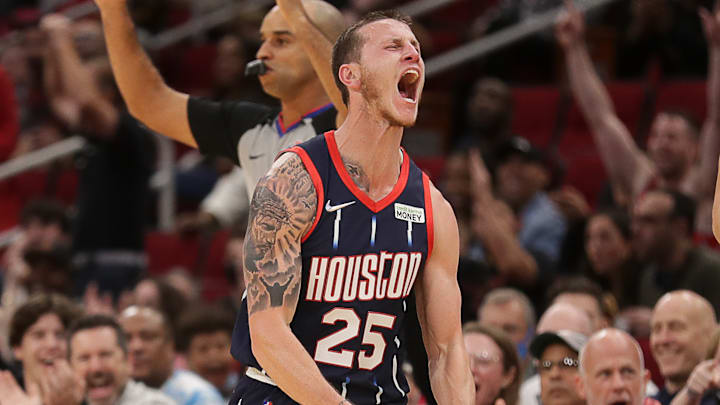
The Good and the Bad From Garrison Mathews
Garrison Mathews is more than just a 3-point shooter. While the three-ball sets up everything else he does offense, he’s a surprisingly varied scorer. However, he provides little in the way of playmaking and his defense is highly reliant on one trait.
The Good
On offense, he essentially only takes layups and threes. 94.1% of his shots came either three feet from the rim or 3-point range. An analytically friendly shot diet is a great way to maximize your efficiency.
Surprisingly, Mathews is also adept at generating free throws. For the season, he averaged 2.8 free throw attempts against 7.1 field goal attempts. Considering 83.7% of his shots came from 3-point range, that’s an incredible feat. His .39 free throw attempt rate was the 19th best mark in the league, and his three-point attempt rate was third.
AND ? ONE ?
— Houston Rockets (@HoustonRockets) January 22, 2022
Garrison Mathews does it again. pic.twitter.com/joOWRTSbSV
No player that played meaningful minutes came close to matching the pair of Mathews’ 3-point attempt rate and free throw attempt rate. He was such an extreme outlier that he has no peers. While that may raise concerns over his ability to repeat the feat, he’s been able to do it over the entirety of his NBA career.
Mathews provides most of his value on offense, but he is sneakily a solid defensive player. His 71 offensive fouls drawn were the most in the league by 20, and he did it in nearly 500 fewer minutes than Derrick White in second place. His ability to draw offensive fouls is simply incredible and allows him to maximize his meager physical traits.
The Bad
Garrison Mathews is a limited player. He isn’t a playmaker, he doesn’t rebound, he hardly dribbles, and outside of getting knocked over, he doesn’t defend. Harping on what he does poorly is a moot point because he simply avoids doing them at all costs.
For all of his strengths, Mathews will never be more than a rotation piece. He can be great in that role, but if asked to do more his entire game would suffer tremendously. The Rockets have him locked up for three more seasons at around $2 million annually. They’re paying him to do what he does well, not expand his game.
